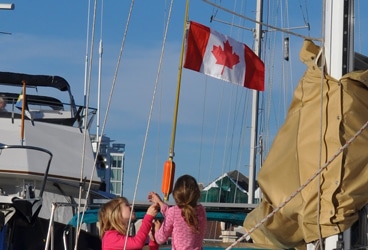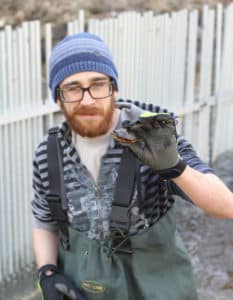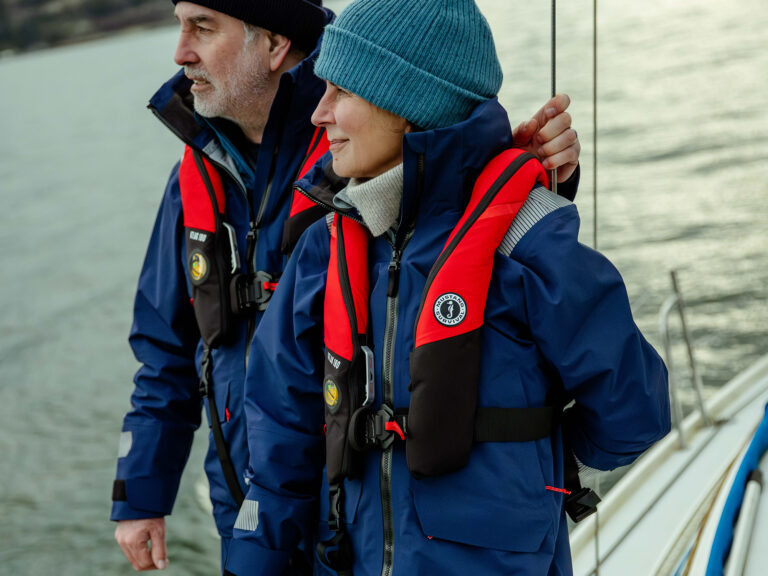
Del Viento- Canada (thumb)
Long time readers of this blog may remember that I have a hard time saying just the right thing when questioned by officials at border crossings (read the last paragraph of this post). I mean, when you’re cruising, the simplest questions are the most difficult to answer. Where’s home? What do you do for a living?
I took the ferry to Port Angeles (USA) a couple weeks back, to have lunch with friends and to pick up the engine hoses I ordered. Returning to Victoria that same day, the Canadian Border Services Agency (CBSA) officer hit me right off the bat with a simple question that was difficult for me to answer: “What’s the purpose of your visit to Canada?”
A question like this paralyzes my brain. He’s expecting a quick, truthful answer and all I can do is stare back. I’m too literal, the wheels in my head are spinning: the purpose of my visit? Hmm. I’m not here on vacation or business, and I would never refer to our eight months in Victoria as a visit… After an awkward pause, the officer’s eyebrows are high on his head. He’s waiting for an answer to his simple question and no doubt wondering whether he has to call in a translator or if there is something wrong with me.
“Uh, we have a boat here, we’re kind of living here for the time being.”
Did I just say that?
“Who’s we? When did you first arrive in Canada?”
“Uh, my wife and kids are aboard now, here in the harbor, we got here in September.”
“Have you applied for residency?”
“Oh, no, no, no,” I tried reassuringly, “we’re not really living here, we’re just waiting here, waiting out the season until we can head north to Alaska. We come and go every 45 days or so to renew our visas.”
I didn’t realize it at the time, but I was applying my Mexico-acquired logic in Canada. In Mexico, a U.S. visitor can stay as long as six months, leave the country for an hour, and immediately return to Mexico with a fresh six-month visa—and they can do this indefinitely, legally. When we planned our eight-month stay in Victoria, we knew we’d be coming and going and it never occurred to us the same strategy wouldn’t suffice to keep our status legal.
“What visas?” he asked.
“You know,” I said, as though I was reminding him, “when I leave the counter here, after you stamp my passport…” His face was blank, just waiting for me to ramble on and further indict myself. “I indicated there on the Declarations form that I intend to stay for 60 days, doesn’t that give me sixty days?”
“Please go have a seat over there, somebody will be with you shortly….Next!”
So I sat in a holding area, on a hard bench with a couple other travelers (both of whom looked very suspect to me), all of us staring through the window in front of us, into a room where yet another traveler twitched nervously and wiped tears from her eyes as officials sorted through the contents of her large backpack.
Ten minutes passed and I was absorbed in the drama behind the glass and still wondering about my own fate when an older official approached me, requested my passport, and disappeared behind a computer. After five minutes, he emerged, motioned for me to remain seated and went to talk to the guy who first flagged me. Then he came back and asked me to follow him, over to an area removed from the drama and other travelers.
“Look, it doesn’t matter if you’re going in and out, you’re basically living here and you can’t do that for longer than six months.”
I assured him we have no intention of trying to live here beyond the season, nor of working. “We even have health insurance.” I blurted out. He just nodded and held up his hand, nodding, before I let him continue.
“You’re fine, you’re heading to Alaska soon.”
“But what do I need to do now?” I asked. “Come the end of March we’ll have been here six months—off and on—we’ve planned a visit back to the States around that time…”
“Don’t worry about it,” he told me, “you may be questioned when you come back through here then, but just tell the officer what you told me. Understand you are not to work.”
It turns out that in Canada, you’re supposed to either apply for residency or otherwise formally apply to extend a visit beyond 180 days. Apparently, you cannot just come and go—starting anew each time—as in Mexico. Officially, once you’ve stayed six months for a visit, they expect you to be gone six months before returning.
But in this case, rather than subjecting us to a ton of burdensome paperwork, or the bribe that may have been expected by an official in some other part of the world, I was shown grace by a reasonable person with the experience to understand the intent of a law and the authority to enforce it thusly. In this post-9/11 world, what more could a cruiser expect?
–MR
I__n our twenties, we traded our boat for a house and our freedom for careers. In our thirties, we slumbered through the American dream. In our forties, we woke and traded our house for a boat and our careers for freedom. And here we are. Follow along at http://www.logofdelviento.blogspot.com/







